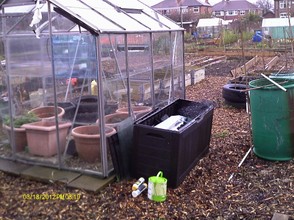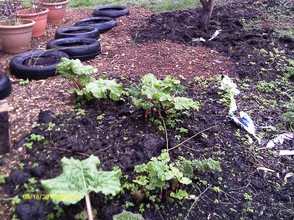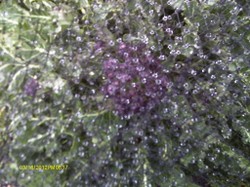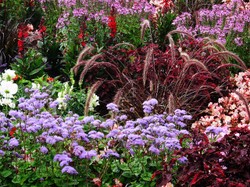Planting the remainder of the beds, those that are not raised, is the main priority. Peas will be planted in succession for a short period to stagger the harvesting time. I am thinking about where to plant the sweet corn, probably just near the raised beds. Sweet corn is a bit of a quandary. I like corn on the cob, and have had some success, but not every cob produces a full complement of seeds in our climate. Corn is a warm weather crop, and we are not in a warm climate. I would like to grow it in greenhouses, but it is wind pollinated and so needs exposure to moving air, otherwise the pollination does not happen. Cauliflowers are a favourite vegetable with me, and so some will be laid down when the weather warms up, along with kale, which resists slugs well. Protecting the cauliflowers against the ever-predatory wood pigeons is urgent, as these little beasts gobble the heart out of a cauliflower.
I need to plant up the greenhouse, but it is a matter of timing. Too early a planting can result in disaster, if a late frost destroys the crop. Tomatoes can be turned to black mush by a simple frost. It has happened to me once before. I need to spruce up the greenhouse, tightening bolts after winter, before I plant.
There is a small greenhouse to be erected. Andrew, my horticulturalist son, will help me. His fiance [due to be his wife in June] is off to her native Portugal to see her mother, who is too unwell to attend the wedding, and so Andrew will be alone. It is good to have a thirty three year old helping with any digging, though it brings home forcefully to me that I am in my mid sixties and slowing down, but still very fit for my age.
But as an allotment committee member [vice chair] I cannot guarantee being able to work undisturbed. The ever-busy and wonderful secretary, Barbara, sometimes comes to discuss an issue, such as the vandalism of the neighbouring greenhouse. Moreover, I have just been elected to the area committee [Urmston Allotment and Garden Society.] Official role, site representative; unofficially, trouble shooter, sent to resolve issues in the most peaceful way possible. You may be surprised that the grumpy individualists who till allotments can be quite quarrelsome sometimes.
You have had a glimpse into the life of a plot holder on a small, but friendly allotment site.The council allotments officer likes our site, because we never give her any trouble. We are short of space and money, though Barbara is a Godsend, as she busies herself trying to obtain grants and hold events. We won an award last year for progress made. This year we want best allotment site in Trafford. It's a hard task, but we live in hope.
I had better work on that flowerbed!
All photographs were taken by Frank Beswick












 The ' Tatton Show 20247 days ago
The ' Tatton Show 20247 days ago
 A Walk Around Mont Blancon 06/25/2024
A Walk Around Mont Blancon 06/25/2024
 Between Britain: A Reviewon 06/19/2024
Between Britain: A Reviewon 06/19/2024
 The Camel Trailon 05/27/2024
The Camel Trailon 05/27/2024



Comments
I always preferred roses.
The first paragraph in your introduction considers that "Gardening does not stop in Winter. Vegetable growers like myself spend time nourishing the soil and preparing for the coming year. But the winter period is a gloomy moratorium, when you look at the empty ground wishing that it were blooming with vegetation. Resolutions for the coming season are made. Mine is to improve my flowerbed, which is not my best point."
What flowers do you generally favor in your flowerbeds?
Might you not have mentioned elsewhere that your wife prettifies the back yard with her own garden? What flowers would she tend toward?
There are a few trees showing, e.g hawthorn and I think elder. But I would have to look around a bit. We recently saw a nuthatch on a tree in the park. Bumble bees are active, we saw some today when gardening in the park.
Cardinals and grackels have been in the south yard foraging -- among box elder, Chinese chestnut and silver maple seeds -- for whatever the already-growing grass shelters. I hear bluebirds, ovenbirds and tufted titmice even as I not yet see where they are or what they eat.
It may be in the 80s (26.67-plus Celsius) tomorrow! No wonder the grape hyacinth shows its purple so attractively near all the yellows of shrubby chamaecyparis, forsythia and spirea and of first-to-bloom daffodils.
What shows up already on your, eastern (Atlantic) pond side?
Flowering time depends on where you are in Britain, which is an island nigh on nine hundred miles long, if you measure it from the Scillies to Shetland. I am in North West England, which is about halfway up the country, and the daffodils are flowering nicely.the flowers in the Isles of Scilly start maybe late January.
The daffodils on the south side of the front porch and on the north side of the slippery elm tree look -- since last week -- like they are going to bloom any day now!
How soon would you say that the earliest-blooming spring flowers will open on your, eastern side of the (Atlantic) pond?
Thank you for the expert experience and expert expertise ;-D!
You have mentioned four vegetables that are hard to grow in window boxes because of their size. Rhubarb is a non-starter because it develops a large crown and takes up much space. Cabbage, cauliflower and broccoli [all the same species] can grow in large pots. Corn needs a square space where there is exposure to air flow, as corn is wind-pollinated. I don't think that any cereals have been successfully grown indoors. In the UK Adam Henson, a television presenter on Countryfile, and a farmer, tried to grow rice in glasshouse conditions, but the experiment was a complete failure. Low light levels at his latitude, somewhere in the early fifties [Southern England] ruined the crop and made it susceptible to fungal infection.
Thank you! I intend to keep all this helpful information in mind as I look at floor-, porch- and window-boxes and sills as easier, simpler gardening projects this spring. (I know it's spring because I finally saw my first fireflies, two each on Tuesday in the south grasses, two each on Wednesday in the west grasses, perhaps two each tonight in the north grasses?!).
But also, I meant to ask you, How would broccoli, cauliflower, corn and rhubarb do in porch- or window-boxes and pots?
My experience with corn is that it can be hit or miss, for some cobs are better than others. However, different varieties will produce different results. I have seen a field of corn in South West Scotland, which surprised me, but I discovered that farmers often grow it as a fodder crop.